|
|
|
Sort Order |
|
|
|
Items / Page
|
|
|
|
|
|
|
| Srl | Item |
| 1 |
ID:
176538
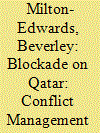

|
|
|
|
|
| Summary/Abstract |
Current tensions in the Gulf region highlight the persistence of crises and conflict. A number of states within the area now regularly engage in interventionist actions that challenge previously held norms of sovereignty and non-intervention. Fragmentation characterises what were once considered fairly robust structures of unity and enduring regional organisation. Theoretical norms that presuppose non-intervention are tested by new forms of coercion and interventionism among Gulf actors that exacerbate rather than resolve security dilemmas. In turn, this highlights the inadequacies of normative models of conflict management and resolution, and in particular mediation. These developments are examined in the case of the blockade against Qatar instituted by Bahrain, Egypt, Saudi Arabia and the United Arab Emirates in June 2017.
|
|
|
|
|
|
|
|
|
|
|
|
|
|
|
|
| 2 |
ID:
176536


|
|
|
|
|
| Summary/Abstract |
In a field that is so loosely theorised, an investigation into intra-GCC conflict is both apposite and challenging. Empirically, interventions by Gulf states have proliferated across the GCC and MENA since 2011. This Special Issue seeks to fill a void in scholarship by looking at the ongoing crisis through the lens of norms. A hypothesised ‘normlessness’ has taken root: a collapse of (local) guiding principles, some even laid down by member states. Disregard for norms of non-intervention, popular sovereignty, mediation, alliance-making and social solidarity poses risks for (sub)regional stability. Provisionally, one notable weakness lies in prescriptive and proscriptive (regulative) norms pertaining to intra-GCC rules of engagement.
|
|
|
|
|
|
|
|
|
|
|
|
|
|
|
|
| 3 |
ID:
176542


|
|
|
|
|
| Summary/Abstract |
The systemic shift triggered by a progressive retrenchment of the United States (US) from the wider Middle East region has been a fundamental game changer in the security perceptions of the Gulf Cooperation Council (GCC) monarchies. The retrenchment activated a security dilemma in US-GCC relations, especially in relation to their view of Iran. However, the impact was uneven. While the dilemma triggered fears of abandonment in the three more hawkish players – Saudi Arabia, the UAE and Bahrain –, it generated fears of entrapment in the three less hawkish players – Oman, Kuwait and Qatar. The key differences between these two camps lie on their threat perceptions. Seemingly shaped by state ideology and religion, narratives of identity, socio-political demography and, finally, leadership cognition, these fears interact with domestic factors such as structural vulnerabilities, to affect the perception of Iran as an existential or non-existential risk.
|
|
|
|
|
|
|
|
|
|
|
|
|
|
|
|
| 4 |
ID:
176539


|
|
|
|
|
| Summary/Abstract |
Donald Trump’s presidency may have altered less in relations between the United States and the Gulf Cooperation Council than recent accounts suggest. Instead, power relations between the US and its Gulf allies have long been, and continue to be, asymmetrical. Dependency theory and postcolonial analysis illustrate the ways in which the US global hegemon exhibits hierarchy, exerting control over Gulf economic resources (oil) and extending its ‘security umbrella’ (e.g. weapons sales and bases) – all in highly unequal dynamics. A critical discourse analysis of American and Saudi speeches during the 2017 Riyadh summit further confirms this assessment. This raises questions about alliance-making and alliance-maintenance norms of promise-keeping and reciprocity.
|
|
|
|
|
|
|
|
|
|
|
|
|
|
|
|
| 5 |
ID:
176543
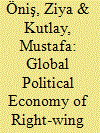

|
|
|
|
|
| Summary/Abstract |
The rise of right-wing populism should be studied as a truly global phenomenon. Domestic and regional contexts are obviously crucial, yet a narrow focus on the domestic realm fails to capture some of the key constituents and paradoxical features of the rise and resilience of right-wing populist projects around the world. Therefore, right-wing populism and the way its contradictions are ‘managed’ ought to be understood within the context of mutual interactions between: 1) an economy-identity nexus and 2) a domestic-foreign policy nexus. A critical review of six controversial aspects of right-wing populism in the global North and global South is used to substantiate this main argument.
|
|
|
|
|
|
|
|
|
|
|
|
|
|
|
|
| 6 |
ID:
176540
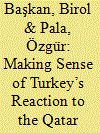

|
|
|
|
|
| Summary/Abstract |
When the Qatar crisis erupted in June 2017, Turkey quickly sided with Qatar, sending tons of food supplies and deploying troops in the Emirate. Yet, from a purely geopolitical and economic perspective, Turkey would have been expected not to take sides given its much larger trade relations with Saudi Arabia and the United Arab Emirates, and their political clout in the region and beyond. It seems that the path dependence in bilateral relations between Turkey and Qatar pre-ordained the former’s reaction. More specifically, by the time the Gulf crisis erupted, Turkey and Qatar had already developed a special relationship, which strongly affected Turkey’s pro-Qatar stance
|
|
|
|
|
|
|
|
|
|
|
|
|
|
|
|
| 7 |
ID:
176537
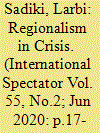

|
|
|
|
|
| Summary/Abstract |
At the core of “disembedded regionalism” in the Gulf Cooperation Council (GCC) is an incapacity to foster more representative forms of politics that are responsive to citizens. Instead, elite-to-elite relations are a salient feature that characterises Gulf politics. A radical re-reading of Jürgen Habermas and John Rawls, applied to the GCC in the first two decades of the 21st century, confirms that top-down management of politics is conducive to conflict and disintegration as against integration, marginalising the agenda of multi-level governance within the subregion. Set against the backdrop of the current blockade/crisis, this critical rendition throws into sharp relief the non-democratic brand of GCC regionalism.
|
|
|
|
|
|
|
|
|
|
|
|
|
|
|
|
| 8 |
ID:
176541


|
|
|
|
|
| Summary/Abstract |
The Qatar Gulf crisis of 2017 saw a number of mediation initiatives, including those of the United States and Kuwait. However, the two countries present two substantially distinct models of third-party intervention: superpower mediation (the United States) and small-state mediation (Kuwait). Comparing the two types of intervention in this crisis in terms of their ability to de-escalate tension and effectively resolve the Gulf crisis with respect to three variables – timing of mediation, leverage of the mediator (hard power versus legitimacy) and interest of the mediator – it would seem that small-state mediation has been more effective in crisis de-escalation, while superpower mediation has further exacerbated the crisis.
|
|
|
|
|
|
|
|
|
|
|
|
|
|
|
|
| 9 |
ID:
176544
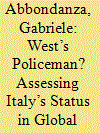

|
|
|
|
|
| Summary/Abstract |
Since the 1960s, and especially the 1980s, Italy has participated in and led numerous peace support operations (PSOs), predominantly under the aegis of international organisations. Italy’s participation in PSOs authorised by the UN, the EU, NATO and other multilateral agreements stems from a combination of national interest and humanitarianism/multilateralism. However, although acknowledged as a significant contributor, a clear assessment of its status in global peacekeeping is still missing. In fact, Italy plays a role that is comparatively greater than all Western nations in the international fora taken into account, and, as such, can be described as ‘the West’s policeman’, from both a quantitative (number of troops) and qualitative (role within the missions) perspective. This might be somewhat curbed in the future, however, due to some of the country’s limitations on foreign policy.
|
|
|
|
|
|
|
|
|
|
|
|
|
|
|
|
|
|
|
|
|